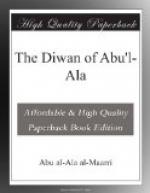As with autumnal harvests cover’d
o’er,
And thick bestrown, lies Ceres’
sacred floor,
When round and round, with never-weary’d
pain
The trampling steers beat out th’
unnumber’d grain:
So the fierce coursers, as the chariot
rolls,
Tread down whole ranks, and crush out
heroes’ souls.[16]
For everything there is decay, and (quatrain 78) for the striped garment of a long cut which now we are unable to identify.
We read in the Wisdom of Solomon: “As when an arrow is shot at a mark, it parteth the air which immediately cometh together again, so that a man cannot know where it went through.” In this place (quatrain 84), if the weapon’s road of air is not in vain it will discover justice in the sky. How much the Arabs were averse from frigid justice is to be observed in the matter of recompense for slaying. There existed a regular tariff—so many camels or dates—but they looked askance upon the person who was willing to accept this and forgo his vengeance. If a man was anxious to accept a gift as satisfaction and at the same time to escape reproach, he shot an arrow into the air. Should it come down unspotted, he was able to accept the gift; if it was bloody, then he was obliged to seek for blood. The Arabs, by the way, had been addicted to an ancient game, but Islam tried to stamp this out, like other joys of life. The players had ten arrows, which they shot into the air; seven of them bestowed a right to the portion of a camel, the other three did not. Abu’l-Ala was fond of using arrows metaphorically. “And if one child,” he writes to a distinguished sheikh, “were to ask another in the dead of night in a discussion: ’Who is rewarded for staying at home many times what he would be rewarded for going on either pilgrimage?’ and the second lad answered: ‘Mahomet, son of Sa’id,’ his arrow would have fallen near the mark; for your protection of your subjects (quatrain 86) is a greater duty than either pilgrimage.” And our poet calls to mind some benefits attached to slavery (quatrain 88): for an offence against morals a slave could receive fifty blows, whereas the punishment of a freeman was double. A married person who did not discharge his vows was liable to be stoned to death, whereas a slave in similar circumstances was merely struck a certain number of blows. It was and still is customary, says von Kremer, if anything is broken by a slave, forthwith to curse Satan, who is supposed to concern himself in very trifling matters. The sympathy Abu’l-Ala displays for men of small possessions may be put beside the modicum (quatrain 92) he wanted for himself. And these necessaries of Abu’l-Ala, the ascetic, must appeal to us as more sincerely felt than those of Ibn at-Ta’awizi, who was of opinion that when seven things are collected together in the drinking-room it is not reasonable to stay away. The list is as follows: a melon, honey, roast meat, a young girl, wax lights, a singer,




